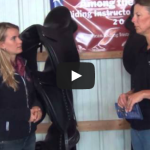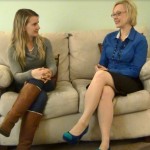The following is a brief interview I was able to do with Mark Rashid and his wife, Crissi McDonald, over delicious Mexican food after the second day of their Aikido for Horsemanship clinic in North Carolina, in which I was a participant.
Mark Rashid is an internationally acclaimed horse trainer known for his ability to understand the horse’s point of view and solve difficult problems with communication rather than force.
Crissi McDonald is also an accomplished clinician, and has been an instructor and horse trainer for over 20 years. Crissi is also guided by the same principles of building trust, communication and seeking softness when working with and riding horses.
Aikido is a Japanese martial art developed for practitioners to defend themselves from attack while also protecting their attacker. The word aikido is roughly translated as “the way of unifying with life energy” or “the way of the harmonious spirit”. The “techniques” or moves in aikido are always initiated from an attack by another person, whether that is a punch, a grab, or a strike with an object or weapon. Aikido has many parallels to riding and horsemanship because the moves are flowing and always initiated from one’s center. Also, softness (not pushing or muscular strength) is key for completing the techniques effectively, and developing feel and timing for the movement of one’s opponent or partner is critical.
Many other principles of aikido can be applied to riding and horsemanship, as Mark explained in the latter part of our interview.
I scribbled notes as quickly as I could while Mark and Crissi talked, then typed this up as soon as I arrived back in my hotel room. Some of their responses are direct quotes and others are paraphrased as best as I could recall them from the conversation and my notes.
Me: You refer a lot to “softness” – what is softness?
Mark: “Softness is an availability in the human and the horse.” It is when all options are available.
Me: Is there a difference between physical and mental or emotional softness?
Mark: They are different but you must have both to have one, it’s more of an internal softness.
Crissi: Softness is an “internal relaxation”, an openness. In today’s world, we don’t have that availability because we have a tightness within, worrying about bills, family, jobs or other stresses.
What we do (in an event such as the aikido clinic) is show what availability feels like. Softness is a choice, it’s not something you do. “It is a noun, not a verb.” It is a different way of living.
Me: Is horsemanship more art or more science?
Mark: It starts with art. Without a connection (with the horse), what good is the science? There is also a lot of faux science out there.
What the horse needs is what you should do. If you are too caught up in the science of it, then the one thing you could do to help the horse you won’t do.
Crissi: Science can also be used just to sell things. It can be used as clever marketing. A good question to ask before doing something would be, is it going to help the horse and I be closer?
Mark: A friend of ours lost both legs mid-thigh while serving in Afghanistan. He has a wonderful attitude and has taken up rowing. He’s very good at it – he won the bronze medal in the Para-Olympics.
I asked him what he does differently now, what has changed.
He told me that in everything he does he asks, “Is what I am doing going to make the boat go faster?”
For us, that question could be, “is what I am doing going to help this horse be ok?”
Me: If there is one thing you could tell your former self, what would it be?
Mark: Quit drinking sooner. There’s not a whole lot I would change, not sure I would have liked myself back then, but I’m pretty happy with how things are turning out. I also would say take more naps.
Me: What are the biggest parallels you find between aikido and horsemanship?
Mark: It only works well if you are soft inside and out. The techniques in aikido work better when you are soft, and we can make horses go along, but they will also work better when we are soft.
Learning technique is important but not as important as the connection. I have seen riders without much skill have a great connection with their horse and a horse that will do anything for them. I also see riders that have been riding all their life and they are pushing, pulling, and kicking at their horse.
In aikido, the techniques will work either way, but softness is the difference between hurting someone and not hurting them.
There are also techniques in aikido where you end up facing the same direction as your opponent, and you see the world from their perspective.
The main thing in aikido is about bringing a peaceful solution to a potentially dangerous situation. Many times we do the same thing in horsemanship.
I have noticed that in aikido, those that are really good at it practice it all the time. The same is true with good horseman and riders.
Thank you to Mark and Crissi for their time answering my questions and allowing me to share them here!
You learn more about Mark on his website: http://www.markrashid.com/
Or learn more about Crissi here on her website: http://www.crissimcdonald.com/
What is one concept or new thought you could pull from this interview? For me, it is asking this question a lot more often – “is what I am doing going to help this horse be ok?”
I look forward to your comments!
Callie
















20 Responses
Just love Mark Rashid’s books. I have them all and learn so much from his wisdom and gentleness. Lucky you going to one of his sessions!
Hey, could you PLEASE do a video on getting a horse used to baths? My horse gets scared when I turned the water on through a hose. I tried pouring a bucket but he gets scared when the water hits the ground.
So my theory is he’s afraid of the sound of the water in the ground. How would I get him used to it?
Thanks!!
*sound of the water hitting the ground
Hi Kate,
Thanks for the video suggestion!
I am reading one of Marks books right now and am really enjoying it!! Can’t wait to get my hands on many more I am so envious that you had the opportunity to take one of his aikido workshops, look forward to the day I have the opportunity
I am so envious that you had the opportunity to take one of his aikido workshops, look forward to the day I have the opportunity 
Hi Kristy,
I certainly recommend participating in one of the clinics when you have the opportunity!
Very interesting and informative, thanks for sharing!
Hi Callie,
Love the way you are sharing bits of your experiences. Thank you for the time and effort you are putting in. The whole concept of inner softness is wonderful. I’ve heard other people try to explain it as a ‘oneness’ with the horse or a ‘oneness with the universe’ or a ‘letting go’, but this simple word, ‘softness’ puts the onus on us to take the ‘hardness’ temperature inside ourselves and decide what to do next. Certainly my horse responds differently when I am truly feeling soft and responsive to her.
Hertha
Well said, Hertha!
This is timely! I’ve been pondering the concept of softness myself today after an interesting lunge session with my horse; who responded more calmly to my suggestions than he ever has before. I was thinking about what had made the difference, and concluded I asked him to change direction, transition much more softly than I usually do; simply because it was sunny and warm and I was feeling relaxed after practicing yoga at home! My horse is quite sensitive and can blow up on me on the lunge, a while back I realised intellectually I needed to be quiet and keep my energy down when asking him to do something but I think today I realised I haven’t been truly been soft and quiet with him because I wasn’t relaxed and soft in my body and I can carry a lot of tension. Today I had that internal physical and mental softness and he responded to that. I totally believe martial arts disciplines can help equestrians, as can any other activity that promotes body awareness. You have many interesting topics, thank you.
Fantastic interview, Callie! Thank you for sharing! I love the technique vs. art discussion. It’s so easy to get lost in technique, and that’s exactly what happens: we lose the connection when we over-focus on technique. (Also, the nap comment is priceless!)
nice to read and hear, thanks for such a great reminder, perfect timing, and THANK YOU for sharing!!
After devouring several of Mark’s books, I feel hopeful that I too can make a real connection with my horse. Thank you for sharing yourself with us Callie! -SA
Hi Sue, glad you are enjoying Mark’s books as well!
Hi Callie.
I am new to the horse world. I first stumbled upon Mark Rashids books then onto your videos. I felt like I found a gold mine of knowledge and help. I have been able to attend a clinic and hope to attend more. Thank you for your weekly videos. It has helped me love this new life with my horse.
Welcome to the CRK Training community!
-Julia, CRK Training Community Manager
Hi callie, could you pls add more videos for horse riding in future.